|
16 St. Radigund's Road
St Mary Northgate
Canterbury
01227 455963
http://www.thedolphincanterbury.co.uk/
https://whatpub.com/dolphin
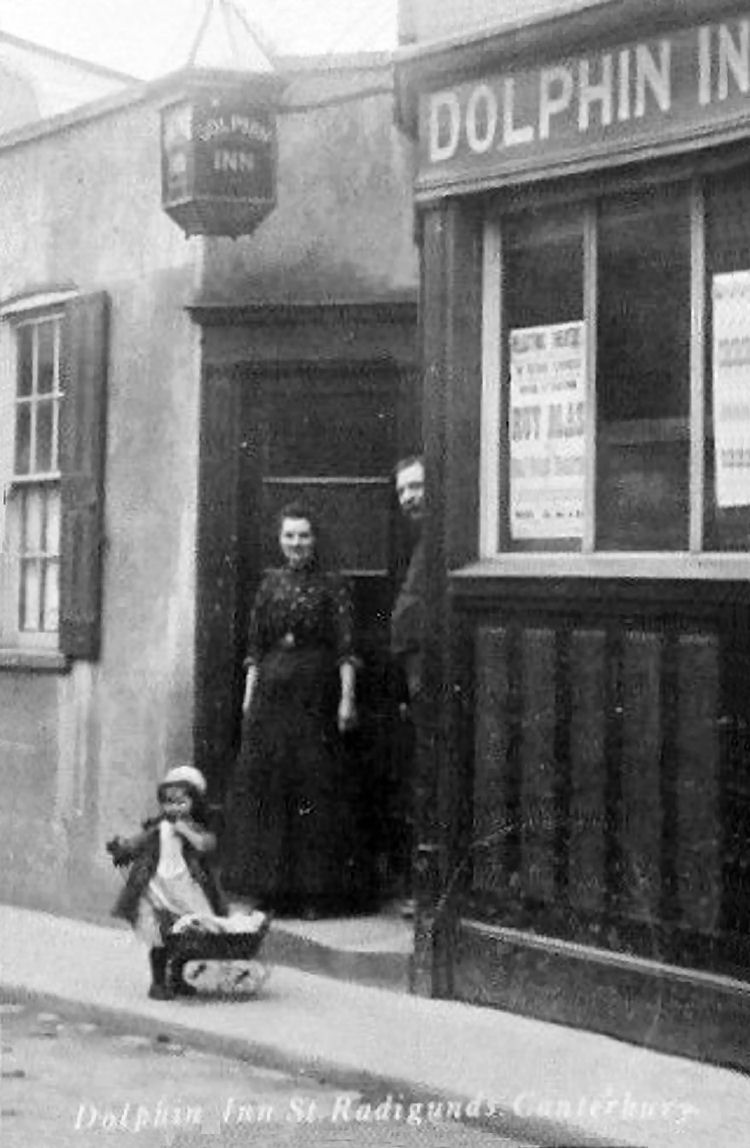
Above photo, circa 1910, kindly sent by Rory Kehoe. Showing Mr. & Mrs
Alfred Sutton outside the original building. |
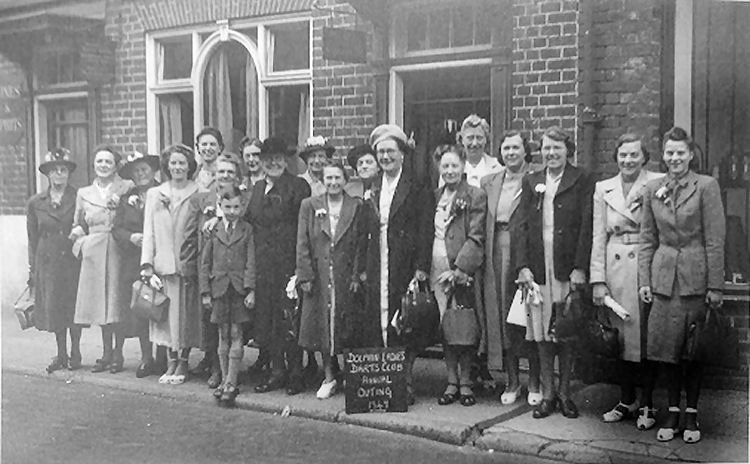
Above photo showing the ladies darts club outing in 1949. Kindly sent by Rory Kehoe. |
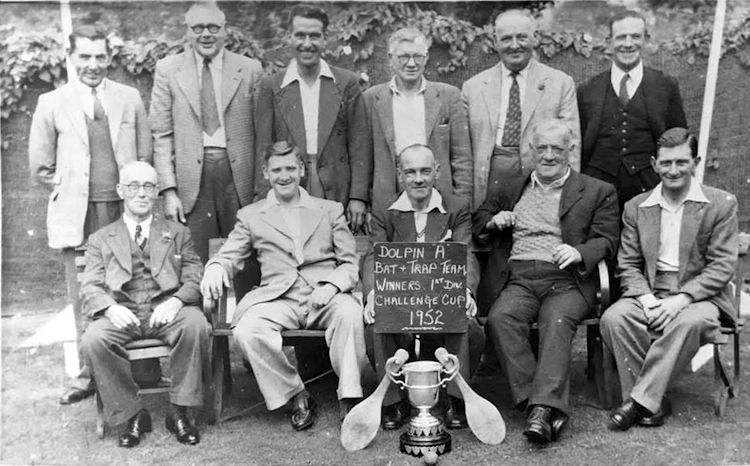
Above photo, 1952 showing the Bat and Trap team. Names unknown. |
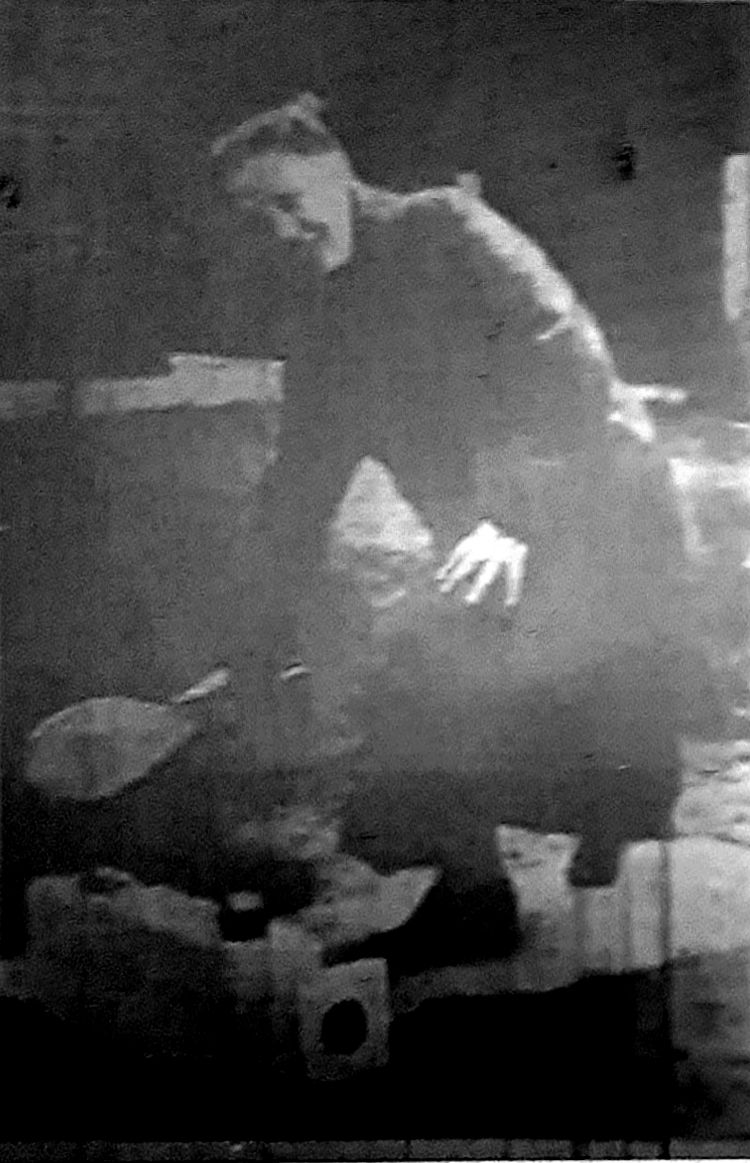
Above photo showing Elizabeth Twinning, age 71 playing Bat and Trap in
1954. She played in the same team as her daughter. |
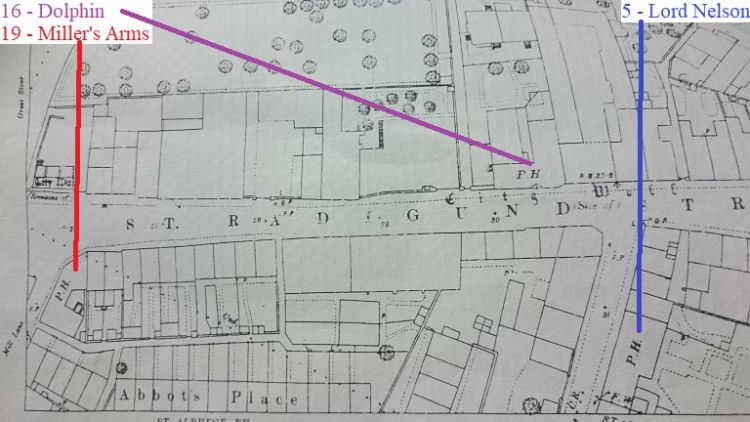
Above location identified on the 1874 map by Rory Kehoe. |
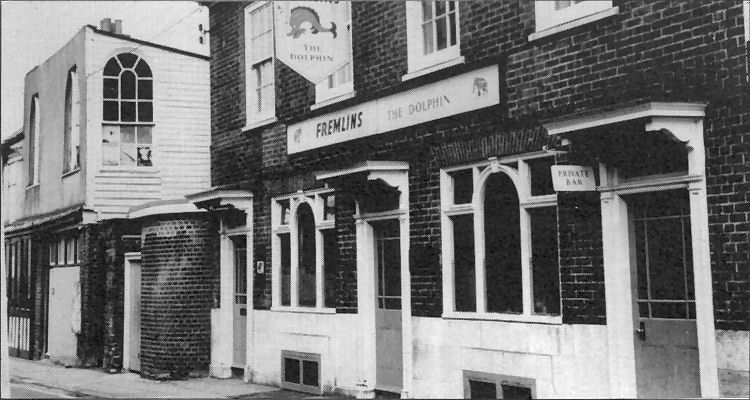
Above photograph by Edward Wilmot 1965. |
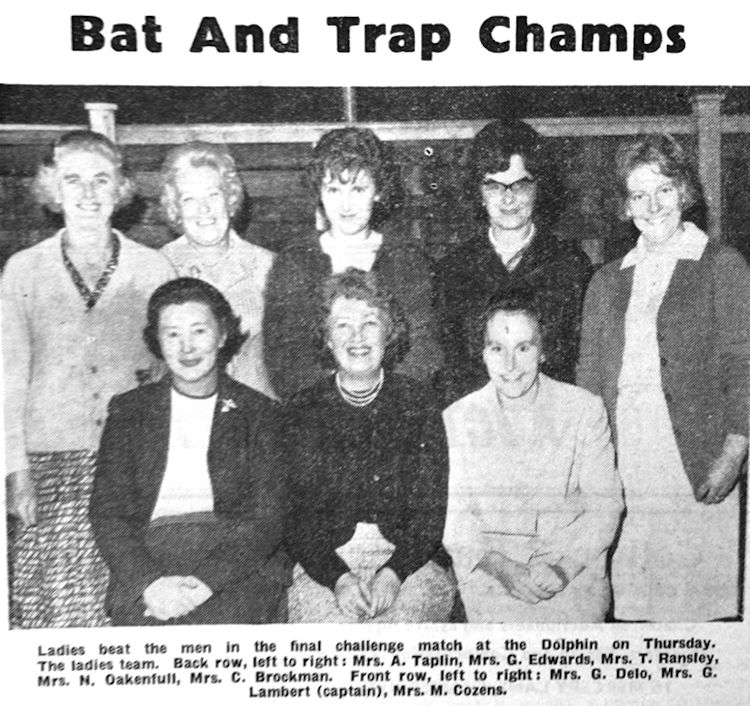
Ladies beat the men in the final challenge at the "Dolphin" on Thursday.
The ladies team. Back Row L to R:- Mrs. A. Taplin, Mrs. G. Edwards, Mrs.
T. Ransley, Mrs. N. Oakenfull, Mrs. C. Brockman.
Front Row L to R:- Mrs. C. Deto, Mrs. G. Lambert (captain), Mrs. M.
Cozens.
Above cutting 1966, sent by Rory Kehoe. A snippet from the Kentish
Gazette (exact publication date unknown) showing the pub's victorious
ladies' Bat & Trap team. The once famous Dolphin Bat & Trap pitch is now
partly covered in decking, as outdoor eating and drinking is very much
the priority these days. |
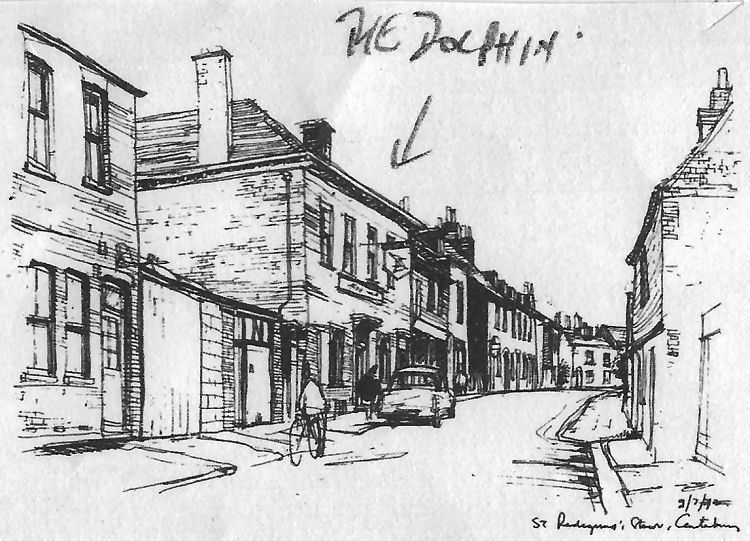
Above print from "City of Canterbury Streets and Buildings," drawing by
John Berbiers. 9 July 1972. |
 Above photo taken by Paul Skelton, 19 May 2012. |
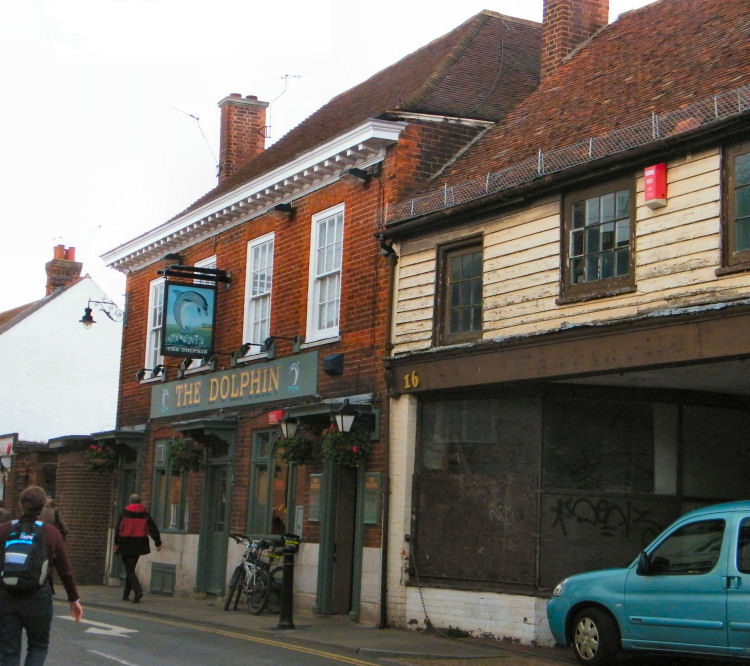 Above photo taken by Paul Skelton, 19 May 2012.
|
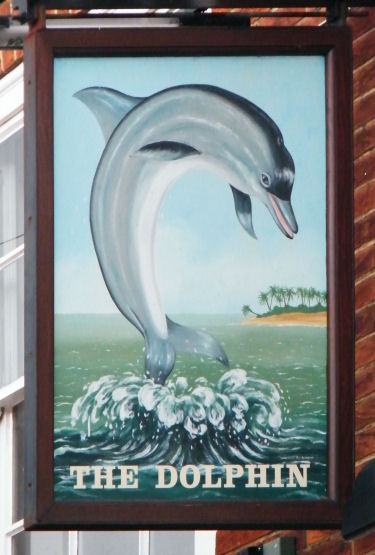 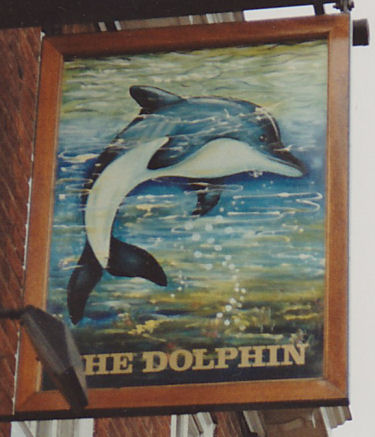
Sign left taken by Paul Skelton, 19 May 2012.
Dolphin sign right 1992.
Above with thanks from Brian Curtis
www.innsignsociety.com |
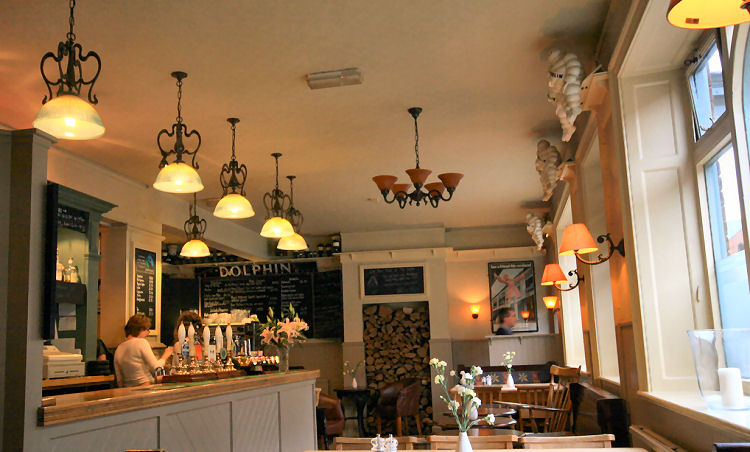
Photo taken 20 October 2010 from
http://www.flickr.com
by Jelltex. |
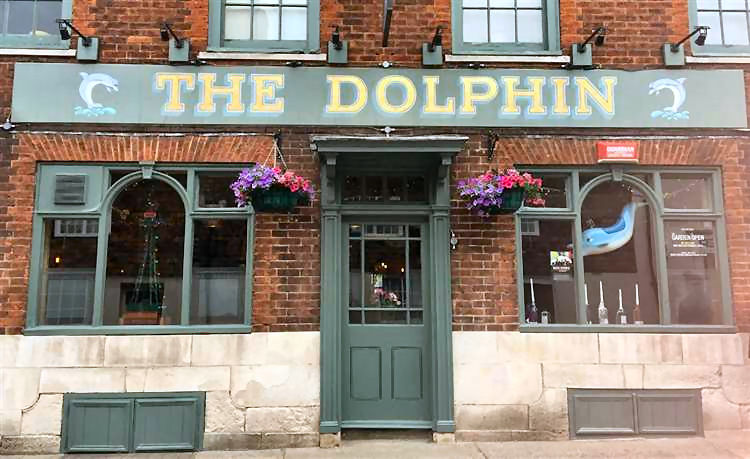
Above photo 2019. |
Said to be probably the third with this name on the same site, but slight
confusion due to there being another called the "Dolphin" situated in Burgate Street in 1689.
However Stapleton's
Guide of 1838 referred to this as the "New Dolphin."
1793 saw the property sold to the Mayor and Commonality of Canterbury,
called "The Bath House and the Bath outhouses etc. in the occupation of John
lade of Canterbury, Leather seller, deceased, the late owner and
proprietor," and the City Corporation owned the building till 1853,
between which it was leased out to a number of people.
Until 1922, the Dolphin had been a tied house within the estate of George
Beer's Star Brewery, Canterbury. After Beer's 1922 merger with the
Faversham-based brewery, W.E. & J. Rigden, the Dolphin became a George Beer
& Rigden house. This situation ended in 1949 though, when Fremlin's acquired
George Beer & Rigden and like about 80% of Canterbury's pubs, the Dolphin
went "under the Elephant."
|
Kent Herald, 8 September 1825.
At the monthly meeting of the Magistrates of this City on Thursday, the Court
granted a licence to Mr. John Minter, coach-master, to build an Inn on the site
now occupied as a coach office, &c, in the High Street; to be called the "Lion."
At the same time a licence was granted to Mr. Large, to build an Inn near the
Cold-bath, to be called the "Dolphin." This latter house will be situated close
to the basin of the intended Stour Navigation.
|
|
From the Kent Herald, 30 August 1827.
To let by Auction, at the Guildhall of the City of Canterbury, on Tuesday, the
11th day of September next at 12 o'clock at noon, for the highest yearly rents
the best bidders may be willing to give, (subject to such commissions as shall
be then and there produced,) on Leases for 21 years, to commence on the 10th day
of October, 1828.
....
Lot 5:- All that free public house, called or known by the name of the
"Dolphin," (formally the Bath House,) together with an excellent Piece of Garden
Ground in front, containing, by admeasurements, 21 Perches, little more or less,
and now in the occupation of Mr. James Large.
Lot 6:- All that messuage or tenement adjoining the "Dolphin Inn," with the
Workshops and Stables thereunto belonging, now in the occupation of Mr.
Prentice, Worsted Manufacturer; together with a piece of Garden Ground,
containing, by admeasurement, 14 perches, little more or less.
....
The above Estates are situate, lying and being in the several Parishes of Saint
Alphage, Holy Cross Westgate, and Saint Mary Northgate, or some or one of them,
in the City and County of Canterbury.
For further particulars enquire of Mr. John Nutt, Town Clerk; or Mr. Cooper,
surveyor, Canterbury; at whose office maps of the several lots maybe seen.
By order of the Mayor and Commonalty, John Nutt, Town Clerk.
Canterbury, 21st August, 1827.
|
|
Kent Herald, 20 October 1825.
"Dolphin Inn," Cold baths, Canterbury.
James Large, respectfully informs his friends and the inhabitants of Canterbury,
that he has this day opened his new house - and it is free, assures those who
may honour him with their support, that they may depend upon being served with
the most genuine Wines and Spiritual liquors, Ashe's fine Ale, - and Reid and
Co's London Porter.
J. L. earnestly invites the support of the public in his new and endearing
undertaking, and no plans will be spared to contribute in the comfort of those
who may Honour him with their patronage.
Cold Baths, October 19, 1825.
|
|
From the Maidstone Gazette and East Kent Courier, 4 September, 1827.
To be let by auction.
At the Guildhall of the City of Canterbury, on Tuesday, 11th day of
September next, at 12 at noon, for the highest yearly rents the best
bidders may be willing to give, (subject to such conditions as such be
then and there produced) on leases for 21 years, to commence on the 10th
day of October 1828.
Lot 5:- All that free public house, called or known by the name of the
"Dolphin," (formerly the Bath House) together with an excellent piece of
garden ground in front, containing, by measurement, 21 Perches, little
more or less, and now in the occupation of Mr. James Large.
Lot 6:- All that messuage or tenement, adjoining the "Dolphin Inn," with
the Workshops and Stables thereunto belonging, now in the occupation of
Mr. Prentice, Worsted Manufacturer; together with a piece of garden
ground, containing, said measurement, 14 Perches, little more or less.
|
Earliest mention of this premises as a public house was in 1827 with
as licensee, and then George Pepperday in 1832 and Henry Bird in 1842 who purchased the
property at auction in 1853 for £405. In 1853, John Washington Davey bought the Dolphin
Inn in Canterbury (formerly St Radigund’s Bath) for £405 along with the land
known as 'St Radigund's Garden. Some time after this, the Dolphin was moved
to its present location, at 17 St Radigund's Street, on what had once been
the formal garden. The bathhouse building was converted to residential use -
1 & 2 Cold Bath Cottages, which are not found in local directories after
1937. In 1960's slum clearances and many other older properties in the area were
also pulled down, and the St Radigund's Car Park was built over a large
portion of the Baths site.
In 1838 it was mentioned in a local directory as being called the "New
Dolphin" indicating that there may have been an older or original one on the
same site or perhaps nearby. However, further research states that it
changed name to the "Dolphin" in 1827. A list in 1878 omits either a
"Dolphin" or "New Dolphin."
George Beer bought the premises in 1865 with 2 cottages at the rear and
the entire was demolished for rebuilding shortly after.
The "Dolphin" appears again in an 1888 directory, with Mr. H. Pocock as
in-keeper and corn-dealer.
The pub seems to have disappeared again in 1902/3 when the address was
given as Alfred Sutton, Laming and Sons, builders and undertakers.
Whitbread files state the building was rebuilt again in 1927 just after
George Beer and Co amalgamated with Rigdens Brewery, and replaced the older
property. The building today is situated on the site of the garden of the
previous building which stood back a little from what was called Lock Lane
in 1827.
An entry in Fremlin's 1950s publication called "Where shall we go,"
indicated the following:- Phone number - Canterbury 2064. Parking
accommodation - Free Car Park opposite. Coached approximately 3/4 mile.
Lunch - No (Sandwiches only). Tea - No (Sandwiches only). Remarks - Piano
available. Large Club room, exceptionally fine bat and Trap lawn with nice
garden. 2 minutes Cathedral.
|
From Kentish Gazette 27 March 1838.
GEORGE B FOREMAN, MERMAID INN, ST MARGARET'S, CANTERBURY.
Respectfully announces to his Friends, the Citizens, and Residents of
the Neighbourhood, that his Opening Dinner will take place on Tuesday,
the Tenth of April next, when the company of themselves and friends will
be esteemed a favor.
Tickets, including waiters and dessert, 5s., to be had at the Bar.
Dinner on Table at Four o'clock.
|
|
From the Kentish Gazette, 1 May 1838.
MR. HENRY BIRD.
HAS to offer for SALE by PRIVATE CONTRACT, all that PUBLIC HOUSE, and
SPIRIT SHOP, in full trade, called the "Dolphin," and TWO COTTAGES and
garden adjoining, situate in Saint Radigunds-street, in the city of
Canterbury, held under lease from the Corporation of Canterbury, of
which there were 23 years unexpired on the 25th of March last. The whole
are in good repair and produce a clear income of £26, alter payment of
all outgoings.
For particulars apply (if by letter, post paid) to Mr. Bind, auctioneer,
Burgate-street; or to Mr. DeLasaux, solicitor, Castle-street,
Canterbury.
|
|
From the Kentish Gazette, 29 September 1840.
FAVERSHAM.
The gentleman of the "Faversham Cricket Club" brought the season to a
close on Wednesday last. After a friendly game, the members,
accompanied by their friends, repaired to the "Dolphin," where they sat
dawn to an excellent dinner, served up in that superior style for which
Mr. Hodges has become so justly famed.
|
|
Canterbury Journal, Kentish Times and Farmers' Gazette, Saturday 11 December 1841.
Insolvent Debtor.
To be heard at the City of Canterbury in the county of the same City, on
the seventh day of March, 1842, at the hour of 10 in the forenoon
precisely.
Thomas Admans formerly of the "Crown and Anchor" public house, King
Street, Canterbury, Kent, licensed victualler; next of the "Dolphin"
Public House, St. Radigund's Street, Canterbury, aforesaid licensed
victualler, before said of King Street; and late of North Lane,
Canterbury, aforesaid, out of business and employment.
James Nichols.
No. 8, Cook's Court, Lincoln's Inn London.
For the Society for Relief of Debtors.
|
|
Kent Herald, 13 March 1845.
To be sold by Auction, by Mr. Pout.
At the Guildhall, Canterbury, on Tuesday, the 18th day of March, 1845, at 12:00
at noon, by order of the Council of the City and Borough, with the sanction of
the Lord's Commissioners of Her Majesty's Treasury. The following valuable
Freehold Property, in lots, subject to such conditions as will be then and
they're produced.
....
Lot 5:- All that Messuage, Tenement, or Inn, called the "Dolphin," outhouses,
yard, and appurtenances, and a piece of garden ground in front thereof, situate
in the said parish of St. Mary, Northgate, on Lease to Mr. Henry Bird, for the
remainder of a term of 30 years from Lady Day, 1831, at the yearly rent of £30
pound.
....
For further particulars, enquire of Mr. John Nutt, Town Clerk, No. 1, Burgate
Street, Canterbury.
|
|
Kent Herald, 28 August 1845.
Death.
Aug. 26, after a few days of the illness, James Maria, wife of Mr. William Pout,
landlord of the "Dolphin," St. Radigund-street, in this city, age 27 years.
|
|
Kent Herald, 21 August 1845.
Ann Austen, charged with breaking a window at the "Dolphin" public house,
settled by paying the damage done.
|
|
From the Kentish Gazette, 2 September 1845.
DEATH.
Pout:— August 20, after a few days illness, Jane Maria, wife of Mr. W.
Pout, of the "Dolphin" public house, St. Radigunds street, Canterbury,
aged 27.
|
|
Kent Herald, 20 November 1845.
Canterbury Petty Sessions. Guildhall. Before the Mayor and Magistrates.
The landlords of the "Red Lion," Love Lane; "Kentish Cricketers," St Peter's
Street; "Plough", St. Peter's Lane; "Dolphin," St. Radigund's; and the "Lord
Nelson," Knott's Lane; for permitting disorderly conduct in their houses, were
reprimanded, and cautioned not to offend again, or they will be fined in the
full penalty.
|
|
From the Kentish Gazette, 12 September 1848.
GENERAL LICENSING DAY.
Thursday being the annual licensing day of victuallers, in Canterbury,
the magistrates were occupied some time in making the necessary
preparations, and they granted licenses to a hundred and twenty-seven
persons; four others being absent, will have theirs at a future sitting.
There were eight fresh applications - two of them for restorations of
the licenses to H. Gills of the "Dolphin," St. Radigund-street, and W
Knott, "Plough," St. Peter's Lane, which were still
withheld, and one by
R. Pilcher Baggs, for a house No. 6, Castle-street, refused.
|
|
Kentish Gazette, 16 December 1851.
ST. AUGUSTINE'S PETTY SESSIONS.
STEALING BARLEY.
Friday, December 12.
(Before William Delmar Esq.)
Henry Gillis, Thomas Streeting, and John Hudson, were charged with
stealing six sacks of barley, on the 9th instant, the property of Thomas
White Collard.
Mr. Ashenden, superintendant to Mr. Collard, deposed that some barley
had been thrashed recently at Brotherhood Farm, Nackington. It was
finished last Saturday; the prisoner Hudson was engaged there, with
another man and a boy; it was being cleaned on Monday. It was the duty
or Hudson to lock up the barn, and give the key to Saunders, at the
house. On Tuesday morning the prisoner Hudson was cleaning the barley
over the second time. I asked why they had not cleaned it all i one day.
Langford replied, because it wanted so much chopping. From the
appearance, I thought some of the barley was gone. The next morning I
examined the heap, and knew some considerable quantity had beet taken.
I then asked John Hudson how he had left the barn the previous night,
and if he thought he had lost any of the barley. He said he had left it
safe, and that he had not missed anything. I took a sample of the barley
to Canterbury, when Oakenfull asked me if I had lost any barley; I
therefore accompanied him to the station-house, where I saw six sacks of
barley, which corresponded with the samples. I have no doubt of its
being the property of Mr. Collard. (The samples were here produced.) It
corresponded both in colour and quality; there were those kind of seed
of weeds in the barley at the station-house which I had noticed in the
barley at the barn at the farm. An entrance could be obtained into the
barn by lifting up the bay boards without using any force.
Thomas Langford, of Canterbury, in the employ of the prosecutor, deposed
that he commenced cleaning the barley with Hudson on Monday morning;
they run it through once. He commenced chopping it, which they finished
on Tuesday. He thought there were about 8 qrs. done on Monday. Witness
and the prisoner left together on Monday night, when both the doors were
fastened up by the latter. It was light on Tuesday morning when he went.
Hudson unlocked it. Saunders gave witness the key of the barn, when
Hudson called him back, and told him there was no occasion to be in such
a hurry. Witness slipped for a short time, and gave the key to the
prisoner. They then both entered, and proceeded to finish chopping the
barley.
James Saunders, living on the farm premises, foreman to the prosecutor,
said I remember the prisoner Hudson bringing in the key of the barn
about six on Monday evening; it was in my possession all night. The next
morning, about six, I gave it to Langford. I was in the barn on Monday,
and I thought there would be 9 or 10 qrs. of barley, after it was
cleaned up. Hudson sleeps with the waggoner, in the house. They both left
the house about seven on Monday night, and I do not know when they
returned.
John Paten, the waggoner, left the farm with the prisoner after supper,
and went to Canterbury to a public-house — the "Dolphin;" and left it
about three o'clock the following morning; the prisoner went part of the
way home with witness; to within about 20 rods of the farm-yard. Witness
got a light, and went to his horses. The prisoner did not give any
reason for stopping at the meadow. He joined witness at the stable about
20 minutes afterwards, and remained till breakfast time, five o'clock.
The prisoner Gillis is the landlord of the "Dolphin;" he served witness
with some beer at that house. Hudson went out two or three times, and
was absent for about an hour one time. There were soldiers and other men
in the tap room. Did not see the prisoner Streeting there.
Police-constable Epps was on duty in St. Dunstan's on Tuesday morning.
Saw the prisoner Thos. Streeting about a quarter past 2 driving two
horses. In about half an hour afterwards, witness saw him with a horse
and cart empty in North Lane; there was no one with him. About a quarter
past six he saw the same cart, with a quantity of sacks in it pass down
Pound lane; it was going at such a rate witness could not distinguish
the person it. He traced the cart to the "Dolphin," and saw a person
take a sack out of it, and go into the "Dolphin." Streeting then drove
the cart to his residence in Nott's Lane. Witness obtained assistance,
and went to the "Dolphin," knocked Gillis up and inquired of him what
had become of the sacks just brought in? He said what sacks? Witness
then saw six sacks standing in the passage containing barley, and told
the prisoner he charged him with receiving barley knowing it to be
stolen. He replied that he bought it a fortnight before, and that he had
not stolen it.
Police-constable Holloway, about 6 on Friday morning, went to the back
of the "Dolphin" public-house to search, while Epps went to the front.
He asked to be admitted at the back door, but Epps could not open it for
the corn standing in the passage. The prisoner was told he must go to
the station-house; he then took a pair of dry boots and went with Epps
shortly after witness went down the cellar, and found the boots
produced, with wet mud adhering to them; he had since examined the
ground near the back of the barn, and found the footprints corresponded
with one of the boots found in the cellar and also with one of
Streeting's boots. He also tracked the cart from the "Dolphin" to the
prosecutor's farm.
James Sampson, police-constable, went to Streetiog’s house at 6 on
Tuesday morning, and asked him if he had fetched any corn that morning.
He said he had not, and stated that the cart standing in the lane was
his brother's, but admitted that he had just taken a horse out of it. He
then then took the prisoner into custody. There were several cleaves of
corn in the cart.
A porter belonging to the South-Eastern Railway Company proved letting
the prisoner Streeting pass through the gate at St. Stephen's, on
Tuesday morning, about half past three, he had come in the direction of
North Lane, Canterbury; the cart was empty. About half-past five he let
the same cart pass back again with sacks in it; Streeting was not then
with the cart, a short man was driving. Oaken full, constable, deposed
to taking Hudson it to custody, on suspicion of having something to do
with stealing the corn. He said he knew nothing about it, and that he
could bring his mate to prove that he was in bed all night.
Superintendent Walker examined the house of Gillis on Thursday evening,
and produced a coat, which he found there, said by the prisoner’s
housekeeper to be his property. After the usual caution had been given
by the Bench, the prisoner Streeting said:— Gillis came and knocked me
up on Tuesday morning, and asked me if I could hire him a horse and
cart. I said mine was hired; but I had a horse out at grass near the
railway, and my brother would let me have his cart and harness. I agreed
to have them ready by three o'clock. Before starting I asked where he
was going, and Gillis said to Whitstable. I drove a little way, as far
as St. Stephen's Green, because I did not know whether the horse would
go or not, and then returned home. About a quarter before six, Gillis
returned with the horse and cart, and I assisted him in it, with the
corn.
The prisoners were then committed for trial.
Application was made to be admitted to bail, but the Bench refused to
accept it.
|
|
Kentish Gazette, 13 January 1852.
EAST KENT QUARTER SESSIONS.
On Friday last these sessions were opened it St. Augustines, Canterbury,
before J. B. Wildman, Esq., chairman, and the
following magistrates:— Sir N. E. Knatchbull, Bart., Sir E.
Dering, Bart, Sir Brook W. Bridges, Bart., W. O. Hammond, Esq., G.
Gipps.. Esq., Rev. N. Toke, W. H. Carter, Esq., E. Jarman, Esq., Ed.
Foss, Esq., G. M. Taswell, Esq., Wm. Delmar, Esq., Wm.
Burra, Esq., T. H. Mackay, Esq., M. Bell, Esq., W. A. Munn, Esq., the
Rev. J. Hilton. &c.
STEALING BARLEY AT ST. STEPHEN'S.
Henry Gillis, 35, Thomas Streeting, 35, and John Hudson, 26, for stealing
three and a half Quarters of barley, value £4, the
property of Thomas White Collard, on the 9th December, 1852, at St.
Stephen's. A second count in the indictment charged
the prisoners with feloniously receiving the barley, well knowing it to
have beer, stolen.
Mr. Barrow, with Mr. Frances, prosecuted on behalf of the Society
instituted for the Protection of Property.
Mr. Horn defended Gillis, and Mr. Dawson, Streeting.
Mr. Barrow minutely stated the case to the jury, and called the
following evidence in support of his position:— James
Ashenden, bailiff to Mr. T. W. Collard, at Brotherhood farm, Nackington,
deposed that the prisoner, Hudson, was in the
employ of Mr. Collard. On Saturday the 7th of December, there was some
barley being thrashed at a barn on the farm. It was
cleaned over once on Monday. It was Hudson's duty to close up the barn.
On Tuesday morning they were cleaning it the 2nd
time there appeared to he a less quantity then. There ought to have been
11 quarters of barley. On Wednesday, I inquired of
Hudson how the barn had been left on Monday, and Tuesday evenings, and
he replied all right. I then took a sample of the
barley and proceeded to the station-house at Canterbury, where I saw 6
sacks of barley—that had only been cleaned once—there were the same sort of seeds of weeds in the barley at the
station-house, as at the prosecutor's barn. I could not see
that any entrance had been forced into the barn.
The front door was looked up—but the back was fastened up by an iron
staple. The bay boards could be lifted up, and an
entrance effected that way. Two or three of the men working on the
premises were aware of this.
Cross-examined by Mr. Dawson. James Saunders—in the employ of Mr.
Collard, remembered the 8th December. He resided
on the farm. The key was in his keeping at night.
After he received the key on the night in question, the prisoner Hudson
and the waggoner went out, and he did not see them
again till the next morning at 5 o'clock.
Paten, the waggoner, deposed that he was in company with Hudson on the
night of the 8th of December. They left the farm
together about 7, and came to Canterbury, to the "Dolphin." They stopped
there till about 3 on Tuesday morning, when they
left for home. Hudson left witness when within 20 rods of Mr. Collard's
farm. Hudson came to him about 20 minutes
afterwards at the stable. While at the "Dolphin," Hudson left for about
an hour. I did not see any one go with him. We had
some beer, but I don't know who paid for it—or whether it was paid for
at all.
Daniel Bourne—I am a gatekeeper on the S. E. Railway Company—at the St.
Stephen's crossing—On Tuesday morning, the
9th of Dec. last, about half-past 3, the prisoner Streeting went through
with a horse and cart,—the latter was empty; he was
going away from Canterbury; at half-past 5, I let the same horse and
cart go back again—it was driven by a short man. There
were 5 sacks in the cart, filled with something.
James Epps, police constable:— On Monday night, the 8th of December, I
was on duty; and on the the morning of the 9th, I
saw Streeting, about a 1/4 past 2, with two horses, going towards his
own house; at a quarter past three, I saw him again
coming from the same direction with a horse and cart, and drive down
North-lane, towards St. Stephen's. About a quarter to
six, I saw the horse and cart again, but can't say, who drove it. I
followed the cart to the "Dolphin," and saw a sack of
something taken into Gillis' house. I was in time to see the last sack
taken in from the cart. Streeting took the cart away to
Nott's lane, near his own house. I afterwards examined the cart and
found some barley clevels. I then obtained assistance,
and went to the "Dolphin," and knocked Gillis up; he came down without
his shoes. I asked him where the sacks were that
had just been brought into his house. He said what sacks. I then saw the
sacks standing. After cautioning him, he said "I
bought the barley a fortnight ago. I did not steal it." I then took him
to the station-house. (Samples of the barley were here
produced.) Gillit put on a pair of Wellington boots, clean, to go in.
James Sampson, another policeman—went to Streeting's house a little
after 6 on the morning in question. I found him
dressed. There was a cart in the lane, which I asked if it belonged to
him. He said no—it was his brothers, and he said he had
just taken a horse out of the cart. There were several clevels of barley
in the cart.
Charles Holloway, police constable, assisted in searching the prisoners
Streeting's and Gillis's houses. At Gillis' house I found a
pair of boots in the cellar, wet and dirty—at the station-house, I took
Streeting's shoes off, they were wet and muddy. Near
Mr. Collard's barn were some boot marks, which corresponded with the
boots taken from Streeting and Gillis. (He described
how he compared the boots with the prints.)
There is another way from Mr. Collard's farm into Canterbury, besides
coming through the railway gate at St. Stephens.
Thomas Oakenfull deposed to apprehending Hudson on the 10th Dec. He said
he knew no thing about the barley, and that
he was at home on the Monday night; he expressed a wish to have the
waggoner, who could prove that he was at home. I
told him that was the man I was going to get against him.
Superintendent Walker searched Gillis's house, and found the coat
produced.
Bourne was recalled, and deposed that the coat produced by the last
witness was something like the one the prisoner Gillis
wore on the morning in question.
Thomas Langford, said, on the Monday, I thought there were about 8
quarters of barley in the barn.
Mr. Dawson then proceeded to address the jury for the prisoner Gillis,
and was followed by Mr. Horn, on the part of the
prisoner Streeting, who called a witness, who gave the prisoner a good
character.
The Chairman summed up, and the jury found all the prisoners guilty.
A previous conviction (16 years ago) was proved against Streeting, who
was sentenced to be transported for 7 years; the
other prisoners were sentenced to 6 months' imprisonment each.
|
|
From the Kentish Gazette, 8 September 1857.
This was the annual licensing day. There were 129 applications for
renewal of licences all of which were granted.
Six beer-house keepers applied for licenses. They were — Edward
Godden, "Pineapple," St. George’s;
John Ratcliffe, "Laurel-tree," Northgate;
J. Stevens, "Dolphin", St. Radigund’s;
T. Rogers, "Sir Robert Peel," High-street;
W. O. Carter, "True Briton," Northgate;
W. Friend, "Eagle Tavern," Ivy-lane.
Mr. Eaden opposed the granting a licence to the "Laurel Tree,"
Northgate, on behalf of the landlord and tenant of the "Providence,"
and read a memorial — signed by a number of the neighbours, in which
it was stated that there were already five licensed houses within a
hundred yards of the applicant’s house.
A counter memorial was presented by Mr. Ratclitffe - signed by about
150 of the neighbours in support of his application, on the ground
that the defendant had kept his beer house in an orderly manner for
the last five years. This, Mr. Eaden declared, was no ground
whatever for granting the application.
The Court was then cleared. Upon the re-admission of the public it
was announced that the license would be granted to the "Laurel
Tree," as also to the "Sir Robert Peel," to the "Eagle Tavern," and
to the "Pine Apple." The applications of the "True Briton" and of
the "Dolphin" were refused.
|
|
From the Kentish Gazette, 15 December 1857.
CANTERBURY POLICE COURT.
Thursday.
(Before Alderman Plummer, William Mount, Esq., and Captain Love.)
The magistrates proceeded to the gaol for the purpose of enquiring
into a new charge of assault preferred against Samuel Pullen, the
private in the East Kent Militia, who was committed for trial some
short time since upon a charge of assaulting police-constable Dodd.
William Flood, who was the prosecutor, said that he was at the
"Dolphin" beer-house on an evening, and two militia men were
drinking with him. He fell asleep, and, while slumbering, received a
tremendous blow on the face, which broke his jaw, but he could not
say by whom it was given.
Maria Brown, who was in the room at the time of the occurrence,
identified the prisoner as the man who indicted the blow on Flood.
He had received no provocation of any sort to induce him to strike
the prosecutor.
The magistrates committed Pullen for trial to the sessions on this
charge also.
|
|
From the Kentish Chronicle, 12 September, 1863.
ANNUAL LICENSING DAY.
Notwithstanding the existence of 160 licensed houses for the sale of spirits
in Canterbury, at the city annual licensing day, on Thursday, there were
seven applications class= class="address"made for new licenses, three only were sanctioned, viz.,
to the “Tally Ho,” Notley street; “Dolphin,” St, Radigund’s street; and the
“Bricklayers’ Arms,” Sturry-road. The old licenses were all renewed, those
parties who during the year had been summoned for misconducting their houses
being cautioned by the magistrates.
|
|
Sussex Agricultural Express - Lewes, East Sussex, England 24 February 1891.
KENT ASSIZES. WEDNESDAY. ARSON AT CANTERBURY.
Sentence of five years penal servitude was passed on William Benson, 62,
publican, and Frederick Benson, 28, labourer, for setting fire to their
house, the "Dolphin Inn," with intent to defraud, at Canterbury on the
23rd January.
The official record stated:- William Benson,
29th January, 1891, Publican, Feloniously setting fire to a house in his
possession, with intent to defraud at canterbury, on the 23rd of
January, 1891.
|
|
Dover Express 16th July 1948.
CLUE OF A WAGES SLIP.
Two Snowdown Colliery miners, James T. Parkinson (28), of 6 Old Park,
Aylesham, and John C. Morris (38) of Zealand Road, Canterbury, at
Canterbury Quarter Sessions on Saturday, pleaded guilty to being
concerned together in breaking and entering the booking office at
Canterbury East Station about 16th April and stealing a trunk containing
clothing and an ATS girl’s kitbag and suitcase, also containing clothing
etc., and 3s 10d from a platform ticket machine; and breaking and
entering Cadbury’s depot at Canterbury East on May 15th and stealing
chocolates and cocoa to the value of 10s 7d.
Both also admitted being concerned in breaking into the “White Hart”,
Canterbury and stealing £4 5s from the till and breaking and entering 3 Worthgate Place, Canterbury, and stealing about £4 5s belonging to
Arthur Shrubsole. Parkinson further admitted breaking into the
“Dolphin”, Canterbury, and stealing money and breaking into "Aylesham
Working Mens’ Club" and stealing bottles of spirits and cash to the total
value of £39 14s 5d.
Mr. J. S. Daniel, prosecuting, said that it was due to the vigilance of PC
Hutchings that a wages slip was found beneath the open window at
Cadbury’s and all these cases were unearthed. The paper led to Morris
and on to Parkinson and, in each of their homes, some of the stolen
property was found. Morris admitted that he had “done the job” after he
had had some beer.
The Recorder (Mr. Eric Neve KC) said it was a very commendable piece of
work on the part of the constable.
DC Packman said Parkinson was before a juvenile court on four occasions
for larceny and shopbreaking and had been sent to an approved school. He
served in the Forces and in the Palestine Police and was discharged with
a very good character. He had earned up to £11 weekly at the colliery
and was married with three children. Morris had no previous convictions
and had been at Snowdown since 1943, was an excellent worker and earned
about £10 weekly. He had seven children.
The Probation Officer reported that Parkinson was a good worker and had
been in no trouble since 1936. He had stated that he was off work and
was short of funds. He did not seem to realise his serious position.
Morris had looked after his children well, but was of the type easily
swayed after a few drinks. He had had a really bad fright over that
case.
The Recorder asked Parkinson if he could give any reason why he should
not go to prison for twelve months, and the prisoner replied that, if he
went to prison, his wife and children would be the obvious sufferers.
Morris attributed the offences to stoppages and strikes which did not
enable him to provide for his wife and family.
He was told to watch his step. The Court would take the lenient course
of binding him over for three years.
The Recorder told Parkinson that they were going to make him care. He
should have been sent to prison for a long time, but he would be
remanded on bail until October, when the course then taken would depend
on the reports on him that the Court received.
|
|
Ladies' Bat and Trap Champion. 1960.
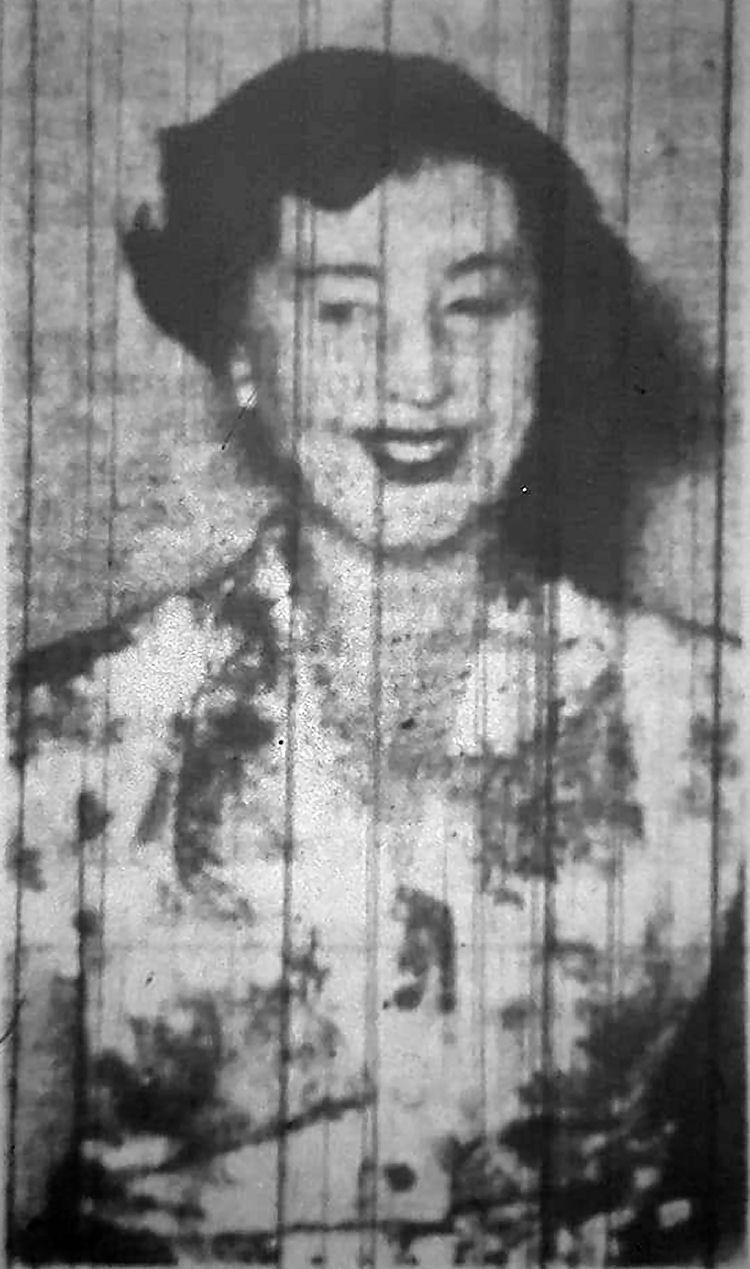
After a very close on exciting contest Mrs. G. Delo of the "Dolphin,"
won the ladies' singles bat and trap tournament at the Gas and Water
Sports Ground, Canterbury on Tuesday.
She beat Mrs. P. Fairbrass, of the Gas and Water, by two games to one.
On her way to the final, she beat the "Sportsmans Arms" and the "Old
City" representatives, whilst the runner up the beat those of the
"Maidens Head" and the R.A.F.A.
|
|
From the
https://www.kentonline.co.uk By Marijke Hall, 9 August 2019.
Popular Canterbury pub The Dolphin is up for sale.
One of the city's most loved independent pubs is up for sale - but the
landlord insists its customers have nothing to worry about.
Peter Mickleburgh, who runs The Dolphin, has confirmed he is selling the
popular boozer in St Radigund's Street after 15 years behind the pumps.
But he says it will remain a pub and expects little will change.

"You wouldn't get change of use on this so it will stay as it is," he
said.
"It will be sold as a going concern and I would very much hope it will
go to somebody who will keep things exactly the same."
He says he is likely to be there until at least Christmas, so customers
can still make table bookings.
The Dolphin, which has a big enclosed beer garden - one of the largest
in the city - is decorated with 1950-1970 memorabilia, with not a single
television screen in sight.
'Things will stay the same and hopefully once it is sold people won't
notice any difference' - Peter Mickleburgh
It is highly regarded and named among the top pubs in Canterbury on
TripAdvisor and was previously CAMRA's pub of the year, all while under
the helm of Mr Mickleburgh.
Speaking about the pub's popularity earlier this year, he put it down to
being independent.
He added: "People can come in and don’t have to compete with the noise
of the football or loud music.
"We’ve also got about 25 to 30 different gins, and we serve good food.”
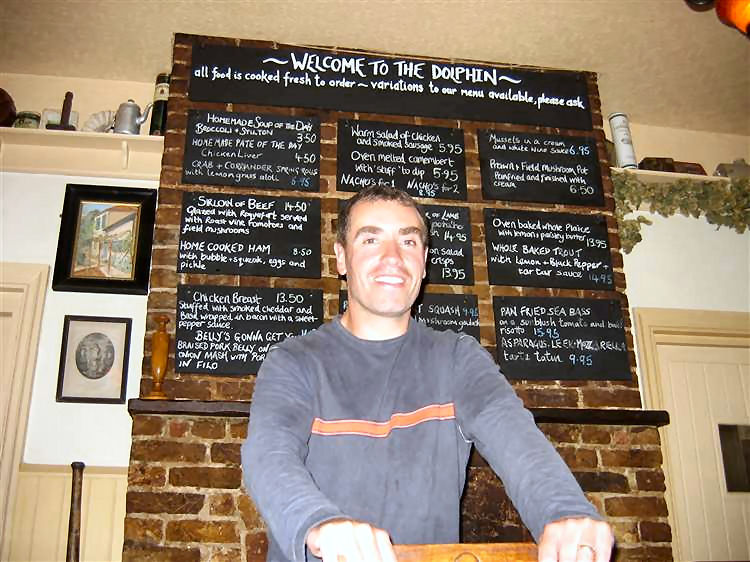
Peter Mickleburgh, landlord of The Dolphin, pictured in 2004 when he
took over the pumps at the popular boozer.
He would not go into detail about his plans for the future, but says
he'll be in the pub for the coming months.
"I don't want people to think that we will be closed," he said.
"Things will stay the same and hopefully once it is sold people won't
notice any difference."
The pub's leasehold is for sale for £195,000 plus stock at valuation.
The sale includes the first floor private living accommodation.
"We've been on the market for two months," he added.
"We haven't got a buyer yet."
|
|
From the
https://www.kentonline.co.uk By Jack Dyson, 19 April 2020.
Coronavirus Kent:
Landlord of "Old City Bar," "Black Griffin," "Seven Stars," "Dolphin" and
"Thomas Becket" in Canterbury racks up £115k debt amid pandemic
A city pub magnate has described his finances as “critical” after
already racking up £115,000 of debt since the outbreak of the
coronavirus.
Businessman Charles Smythe is faced with the hefty bill after being left
unable to pay rent or invoices from big suppliers while his five
Canterbury bars are closed.
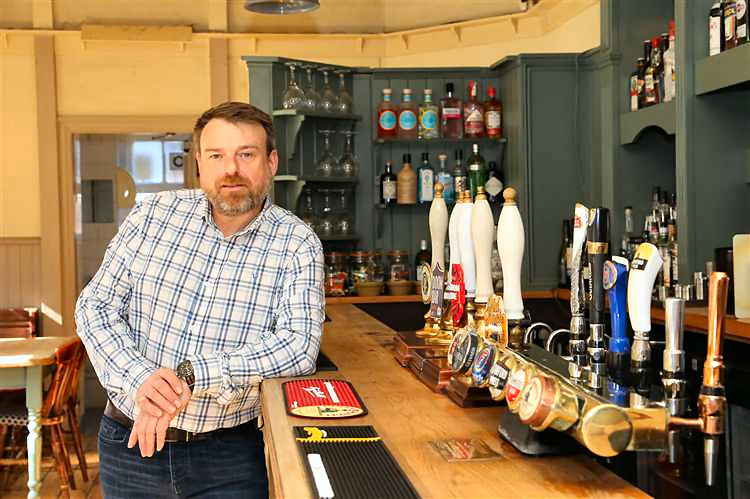 And the 50-year-old - who runs the
"Old City Bar,"
"Black Griffin," "Seven Stars," "Dolphin" and
"Thomas Becket" - believes his outstanding payments
could rise above £200,000 in the next two months.
Despite this, the tavern tycoon insists he will not close any of his
watering holes.
“I won’t get rid of my pubs,” he maintained. “Cash flow is pretty
critical.
“My outstanding debt at the moment is £115,000 - and that’s going up
each week.
“I’ve paid off my little suppliers - like my cleaners and butchers.
“But with the big companies - like the breweries and major suppliers -
I’m saying to them, ‘you’re not getting any money until I get some in’.”
Brewery Shepherd Neame, which owns the "Old City Bar," has suspended rent
for its licensees during the Covid-19 crisis.
But Mr Smythe says the landlords of his four other pubs want him to pay
all outstanding rent in full once he is able to restart trading.
“Lots of them have not cancelled the rent,” he said.
“Punch Taverns and EI Enterprise still want the full rent, but they want
to collect it after we’ve reopened.
“If the rents aren’t waived, my debt will be over £200,000 in the next
six to eight weeks.”
In addition to this, Mr Smythe says he has a total of £8,000 of opened
and unopened beer stored in casks in the cellars of his pubs.
Despite being able to claim back duty on out-of-date beverages from the
government and send a selection of untouched barrels back to breweries,
he expects this to leave him more than £5,000 out of pocket.
Meanwhile, Wetherspoon says its entire stock of beer across its sites in
the area is sitting in cellars unable to be used.
Spokesman Eddie Gershon said: “The pubs closed without warning, so there
was no opportunity to do anything with their beer supplies.
“The pubs are closed and locked up, so the state of the beer is not a
major concern.”
|
LICENSEE LIST
LARGE James 19/Oct/1825-28+

PEPPERDAY George 1832+

FRAMPTON David 1832+
 (Mill Lane)
(Mill Lane)
 ADMANS Thomas 1838
ADMANS Thomas 1838

FOREMAN George B Mar/1838+
WALL George 1840+

COLLYER Jesse 1841+ (age 40 in 1841 ) )
BIRD Henry 1842-53+

GILLIS/GILLS Henry 1847-51+ (age 36 in 1851 ) )

STEVENS John 1857-61+ (widower age 49 in 1861 ) )
OGLE J 1867-68+

OGLE Dinah Mrs 1874+
RUCK Henry Thomas 1881+ (also hay binder age 42 in 1881)
POCOCK Mr H 1882-91+  
BENSON William to Jan/1891
SUTTON Alfred George 1903-22+
   
LEPPER Thomas 1930-38+
 
???? Roy & Avril Mid 1970s-mid 80s
MICKLEBURGH Peter 2004-19
SMYTHE Charles 2020+
https://pubwiki.co.uk/Dolphin.shtml
 From the Pigot's Directory 1828-29 From the Pigot's Directory 1828-29
 From the Pigot's Directory 1832-33-34 From the Pigot's Directory 1832-33-34
 From the Pigot's Directory 1840 From the Pigot's Directory 1840
 From Bagshaw Directory 1847 From Bagshaw Directory 1847
 Greens
Canterbury Directory 1868 Greens
Canterbury Directory 1868
 From the Post Office Directory 1874 From the Post Office Directory 1874
 Census Census
 From the Post Office Directory 1882 From the Post Office Directory 1882
 From the Post Office Directory 1891 From the Post Office Directory 1891
 From the Post Office Directory 1903 From the Post Office Directory 1903
 From the Kelly's Directory 1903 From the Kelly's Directory 1903
 From the Post Office Directory 1913 From the Post Office Directory 1913
 From the Post Office Directory 1922 From the Post Office Directory 1922
 From the Post Office Directory 1930 From the Post Office Directory 1930
 From the Post Office Directory 1938 From the Post Office Directory 1938
 Inns of Canterbury
by Edward Wilmot, 1988 Inns of Canterbury
by Edward Wilmot, 1988
|
















